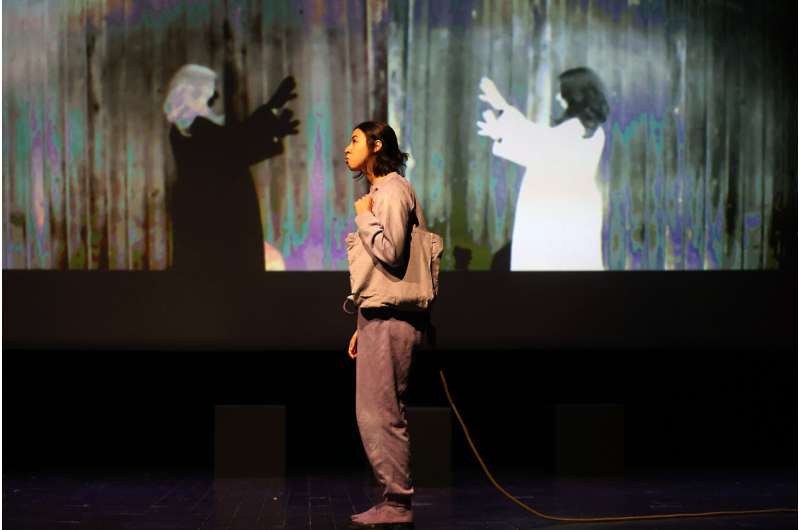Science
Portuguese Theatre Tackles Stigma of Bipolar Disorder through Performance

In an innovative approach to mental health awareness, the Portuguese theatre company Marionet has launched a play titled Oxymoron, Between Solstices and Equinoxes, aimed at reducing stigma surrounding bipolar disorder. The production, which ran from March 20 to 24, 2024, in Coimbra, Portugal, integrates scientific research with theatrical storytelling, fostering a deeper public understanding of the condition.
The play’s development involved extensive collaboration with medical professionals, researchers, and individuals living with bipolar disorder. According to Mário Montenegro, a representative of Marionet and the Center for Interdisciplinary Studies at the University of Coimbra, the company has worked in the realm of scientific theatre for 25 years but has only recently focused on health topics. Montenegro stated, “We felt the need to change our creative process because these were delicate subjects that touched people’s lives. We realized we needed to be even better informed.”
At the heart of the project was a commitment to accurately portray the complexities of bipolar disorder. The creative team conducted interviews with patients, healthcare providers, and family members to gather authentic experiences. This input shaped the play’s narrative, which comprises various scenes and characters rather than a linear storyline, allowing for diverse interpretations by the audience.
After each of the six performances, attendees were invited to complete a questionnaire regarding their emotional responses to the play. Out of approximately 300 audience members, 54 responses were collected. The analysis revealed that emotional engagement played a crucial role in enhancing understanding and retention of information about bipolar disorder. The authors noted that feelings of empathy and personal identification helped demystify the disorder, contributing to a shift in perceptions and reducing stigma.
The use of emotion in the play was intentional, with Montenegro emphasizing that it does not detract from the message’s accuracy. Instead, he believes that well-guided emotional narratives can motivate audiences to learn more about mental health issues, leaving a lasting impact. “We left the interpretation open so that spectators could form their own opinions,” he explained. This approach allows for individual reactions based on personal experiences and sensitivities.
The project has garnered attention not only for its artistic merit but also for its contribution to the dialogue surrounding mental health. Luisa Massarani, a researcher at the Brazilian Institute of Public Communication of Science and Technology, noted the significance of using theatre as a medium for science and health engagement. She stated, “Despite their significant role, emotions are under-theorized and under-researched in science communication.”
The findings from this initiative are detailed in a paper titled “Theatre and Bipolar Disorder: Dealing with Emotions,” which is part of a special issue of the Journal of Science Communication. The study aims to inspire further exploration into the intersection of emotions and science communication, highlighting the potential of creative approaches in educating the public about mental health.
By merging art with science, Marionet’s production serves as a powerful reminder of the importance of understanding and compassion in addressing mental health issues. As mental health continues to be a critical topic worldwide, initiatives like this play a vital role in fostering awareness and encouraging open conversations about conditions such as bipolar disorder.
-

 World3 weeks ago
World3 weeks agoGlobal Air Forces Ranked by Annual Defense Budgets in 2025
-

 World4 weeks ago
World4 weeks agoMass Production of F-35 Fighter Jet Drives Down Costs
-

 Science4 weeks ago
Science4 weeks agoTime Crystals Revolutionize Quantum Computing Potential
-

 Top Stories3 weeks ago
Top Stories3 weeks agoNew ‘Star Trek: Voyager’ Game Demo Released, Players Test Limits
-

 World4 weeks ago
World4 weeks agoElectrification Challenges Demand Advanced Multiphysics Modeling
-

 Business4 weeks ago
Business4 weeks agoGold Investment Surge: Top Mutual Funds and ETF Alternatives
-

 Top Stories4 weeks ago
Top Stories4 weeks agoDirecTV to Launch AI-Driven Ads with User Likenesses in 2026
-

 Lifestyle3 weeks ago
Lifestyle3 weeks agoDiscover Reese Witherspoon’s Chic Dining Room Style for Under $25
-

 Entertainment4 weeks ago
Entertainment4 weeks agoFreeport Art Gallery Transforms Waste into Creative Masterpieces
-

 Health3 weeks ago
Health3 weeks agoGavin Newsom Critiques Trump’s Health and National Guard Plans
-

 Business3 weeks ago
Business3 weeks agoUS Government Denies Coal Lease Bid, Impacting Industry Revival Efforts
-

 Lifestyle3 weeks ago
Lifestyle3 weeks agoLia Thomas Honored with ‘Voice of Inspiration’ Award at Dodgers Event









